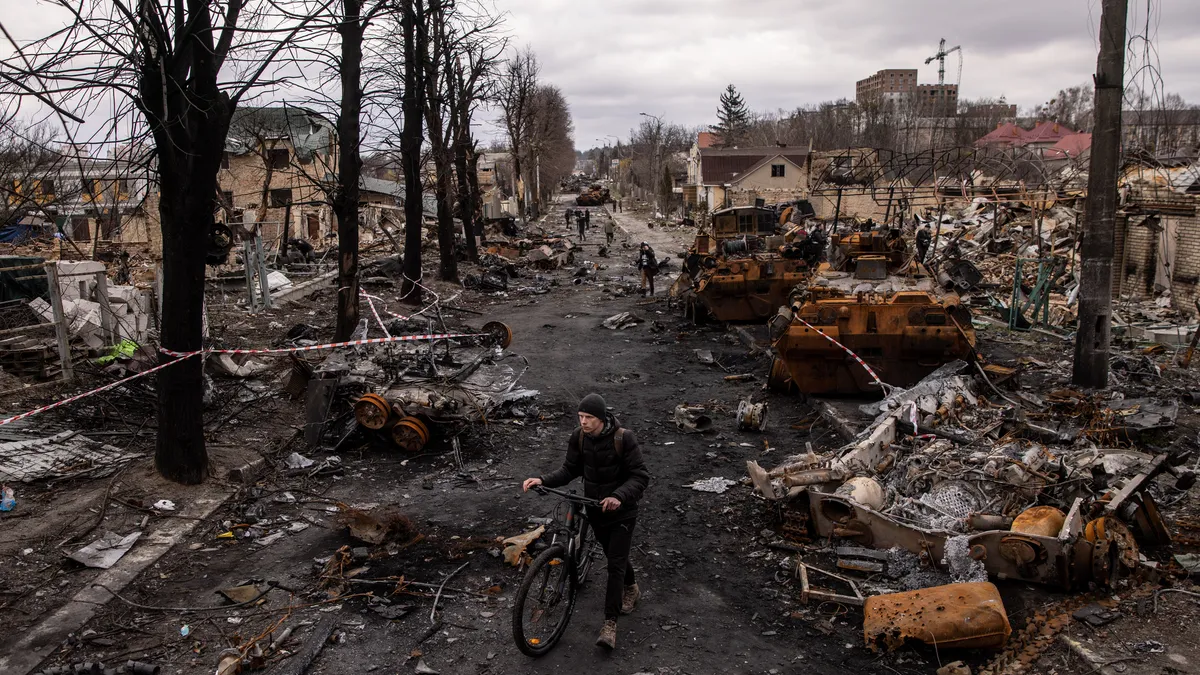Dive Brief:
- Hostile governments targeting companies for coercion, disinformation and other “gray-zone aggression” may eventually make some global business uninsurable without the backstop of government guarantees, according to a report by the American Enterprise Institute (AEI).
- During the past three years, “the risk picture has changed significantly as geopolitical jockeying has begun interfering with the conduct of globalized business with a frequency and magnitude previously unseen in modern history,” AEI said. “The forms of aggression are so new that they are not included by name in any insurance policy.”
- “Geopolitical confrontation is intensifying, but governments know an armed conflict would be disastrous,” according to AEI Senior Fellow Elisabeth Braw. Instead, hostile governments forgo military strikes and harm companies and rival nations by using non-violent tactics such as cyberattacks, “weaponization of migrants” and excavation in the exclusive economic zones of other countries.
Dive Insight:
Many CFOs and their C-suite colleagues identify the rising competitive threat to the West from Russia and China as a major source of risk, according to a survey by Willis Towers Watson.
“This competition is leading to costly economic decoupling and significant political risk losses,” WTW said, describing “an alarming picture of the world’s largest and most globalized companies struggling to manage geopolitical shifts that pose a fundamental challenge to their business models.”
More than half (56%) of executives flagged the threat of governments retaliating against companies in diplomatic disputes and 71% worry about state-sponsored cyberattacks, WTW said.
Companies currently can insure against cyberattacks, “active-shooter” losses, attacks against maritime shipping, and kidnap and ransom, Braw said. Buffering against political risk is far more challenging.
“Precisely because political risks are so varied, unpredictable and idiosyncratic, it has long been difficult to establish what, precisely, falls within political risk coverage — and when, exactly, such an event can be considered as having occurred,” she said. “The financial model for political-risk insurance has, as a result, been difficult to establish.”
Several attacks in recent years on ships in the Strait of Hormuz and Strait of Oman could have been deemed geopolitically motivated but were not declared as such, Braw said.
Similar losses have spread to other sectors. China apparently retaliated against Ericsson after Sweden’s telecommunication authority decided in 2020 to exclude Huawei from Sweden’s 5G network, Braw said. During subsequent quarters Ericsson’s revenues in China slumped.
Similarly, Beijing in 2020 imposed punitive tariffs on Australian wine after Canberra proposed an international investigation into the origins of the coronavirus. The following year, exports of Australian wine to China plummeted 96%.
“Russia’s invasion of Ukraine has opened another front of geopolitically motivated aggression against companies,” Braw said, noting a flare up in cyberattacks and threats by the Russian navy in the Black Sea and Sea of Azov.
Western government sanctions against trade, finance and other links with Russia — and threats by Moscow to seize international companies — prompted more than 750 businesses by April 30 to announce either a cutback in operations in Russia or a complete pullout, she said.
Reprisals such as consumer boycotts or forcing imports to languish in ports do “not neatly fit into any insurance category,” Braw said. “The current geopolitical confrontation is changing risk so much that insurance policies are being updated at record speed.”
Hostile governments are finding new ways to harm rival nations by targeting their native companies, Braw said.
“Current geopolitical confrontation is producing forms of aggression — and thus risk to companies — that are so effective precisely because they have never been used before and because the aggressor can constantly innovate and use new forms of aggression that harm companies directly or indirectly,” Braw said.
“This aggression already involves harming globally operating companies as proxies for their home governments, a practice that is likely to increase because it is inexpensive and carries little risk of retaliation by Western governments,” she said.
Certain sectors and business activities may become uninsurable, Braw said. “Unless governments step in to guarantee the insurance, Western businesses in particular face the likelihood of insurance protection gaps for specific business activities, countries and regions.”














